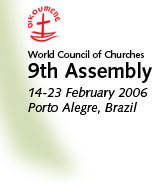 |
WCC > Home > About the assembly > Latin America & Brazil > Brazil > Churches and religion | ||||
| About the assembly | Programme | Theme & issues | News & media | |||||
 |
|
||||
|
A mosaic of faithNCC Brazil Member churches The Assembly was hosted by the brazilian National Council of Churches (CONIC), whose members are listed below:
More on religion in Brazil Nearly all major world religions and religious organizations are present in Brazil. Information obtained from the 2000 census indicated that approximately 74 percent of the population identify themselves as Roman Catholic, although only a small percentage of that number regularly attend Mass. Approximately 15 percent of the population identify themselves as Protestants, an estimated 85 percent of which are pentecostal/evangelical. Evangelical churches have grown rapidly and have challenged the traditional dominance of the Catholic Church. The largest denominations include the Assembly of God and the Universal Church of the Kingdom of God. Lutherans and Baptists make up the bulk of the remaining Protestants, and are centered in the southern part of the country, where the majority of German and northern European immigrants settled during the 19th and early 20th centuries. Followers of African and syncretistic religions such as Candomble, Xango, Macumba, and Umbanda constitute approximately 4 percent of the population. Candomble is the predominant traditional African religion practised among Afro-Brazilians. It centres on the worship of African deities brought to the country as a result of the slave trade. Syncretistic forms of African religions that developed in the country include Xango and Macumba, which to varying degrees combine and identify indigenous animist beliefs and Catholic saints with African deities. The capital of Bahia State, Salvador, where most African slaves arrived in Brazil, is considered the centre of Candomble and other traditional African religions. As a result of internal migration during the 20th century, Afro-Brazilian religions have spread throughout the country. There are approximately 500,000 Muslims in Brazil. Sunni and Shi'a Islam are practised predominantly by immigrants from Arab countries such as Syria, Lebanon, and Egypt who have arrived in the country during the past 25 years. There are approximately 55 mosques and Muslim religious centres. Shintoism is maintained to a limited degree among the Japanese-Brazilian community. Approximately 100,000 citizens identify themselves as Jewish. There are approximately 45,000 Jews in Rio de Janeiro, and approximately 29,000 in Sao Paulo. Many other cities have smaller Jewish communities. Source: US State Department |
|||
|
|
|



